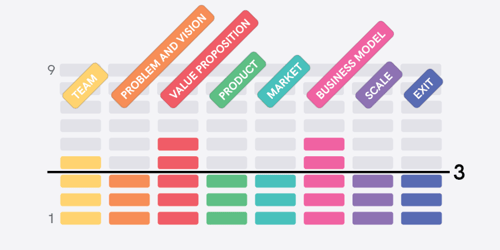November 12, 2020 in Entrepreneur Advice, Abaca
Jake Tamarkin co-founded an insurtech startup that’s "not your dad's life insurance" - with the goal of helping everyday people get coverage for their families that saves money by automatically adjusting based on predictable life events. But fundraising for startup founders is hard. Really hard. “I’d been pitching to a whole lot of different people, but getting feedback along the lines of, 'You guys are great, but you don’t have enough traction for us yet.’”
Then, in a Village Capital financial health accelerator, he and his co-founder had an ah-ha moment when using the tool that informs our investment readiness platform, Abaca. “The [tool] told us, ’Hey, you’re targeting the wrong investors.’”
Village Capital has trained 1,100+ entrepreneurs in our investment readiness accelerator programs. But accelerator programs aren’t necessarily inclusive by nature. Our team asked: what if we could reach more entrepreneurs - no matter where they are - and help them connect with the right investors and resources for their stage, and where they’re headed? How can we make sure common mixed signals between entrepreneurs and investors don’t turn into missed opportunities?
No entrepreneur enjoys hearing “no” or “not yet” — or maybe worse, hearing nothing — from investors. On our new platform, Abaca, we’ve worked to create a space for transparency: on expectations, language, parameters, and the path forward. Investors typically only have time to listen to a pitch and accept or decline, they don’t have time to give feedback or refer them to someone who might be more helpful. That’s where Abaca comes in.
 The platform is built on the foundation of the investment readiness framework from our programs that has gotten the stamp of approval from founders, investors, mentors alike - helping entrepreneurs better position themselves in conversations about important topics, from growing a team to the company’s business model. On Abaca, founders can pinpoint progress across key business categories, chart the path to next critical milestones, and pinpoint what kinds of funding opportunities to go after their current stage.
The platform is built on the foundation of the investment readiness framework from our programs that has gotten the stamp of approval from founders, investors, mentors alike - helping entrepreneurs better position themselves in conversations about important topics, from growing a team to the company’s business model. On Abaca, founders can pinpoint progress across key business categories, chart the path to next critical milestones, and pinpoint what kinds of funding opportunities to go after their current stage.
After the revelation that they should be going after angel investors, Jake Tamarkin’s company reached a turning point: “Everything fell into place. Once we knew to focus on angels, we listened to their feedback more closely. They said they like our product, they like our progress, but they didn’t like the deal we were offering. Easy peasy — we changed the terms of the deal to be more aligned to what the angels were telling us would make more sense for them. And then all of a sudden, everything changed.”
Abaca has over 6,000 entrepreneur members from all over the world. We’re connecting founders with really urgently needed, important innovations with tools to succeed that we previously only shared through our in-person accelerator. Plus companies can match with good-fit investors, accelerators, bootcamps, and other relevant resources. This year, we also launched a COVID-19 Investor Coalition to route capital to startups tackling the public health and economic crises. Startups can join the pipeline to get their solution in front of investors actively looking for deals.
We launched Abaca in “the before times” of 2019 but this year as we’ve seen the entrepreneurship world as we know it change. With fewer opportunities for in-person meetings and networking, we’ve seen how existing networks can become solidified. In the Zoom era, we’re at a crossroads: One possibility is that the few founders with existing connections or friends and family money get the chance to survive and thrive. Or, things could go the opposite way: Entrepreneur supporters could throw the doors open, bringing more promising founders into the fold. That’s what we’re trying to build with Abaca, an (online) space to reinvent the global entrepreneurship system to be more inclusive, transparent, and democratic.
Learn more and join Abaca.
Our newsletters share the latest about our programs, trends, ecosystem leaders, and innovative entrepreneurs in the impact world. Get the latest insights, right in your inbox by subscribing:
Village Capital needs the contact information you provide to us to contact you about our products and services. You may unsubscribe from these communications at any time. For information on how to unsubscribe, as well as our privacy practices and commitment to protecting your privacy, please review our Privacy Policy.